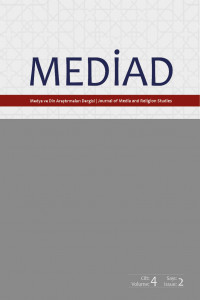Research Article
Aim & Scope
Journal of Media and Religion Studies (MEDIAD), which has started its publication in June 2018, is an international peer-reviewed journal that accepts papers in the languages of Turkish, English and Arabic.
Its mission is to concretize initiatives concerning the relationship between the media and religion in our country, thereby making these initiatives more precise as a field of inquiry, to lay the groundwork for new methodological design of the field, to bring international academic knowledge accumulation to the attention of national academia, and to reflect authentic local, regional and global perspectives in the field.
It includes articles, translations, and book reviews carried out with various scientific methods in the fields of Social Theory, Religious Sciences, Communication Sciences, Media Studies, Psychology, Law, Philosophy, Literature etc., focusing on different implications of the relationship between media and religion.
Author Guidelines
Journal of Media and Religion Studies (MEDIAD) has started its publication in 2018 within The Center for Media and Religion Studies (MEDIAM) in Erciyes University. It is an international peer-reviewed journal published biannually, in June and December.
It includes articles, translations, and book reviews carried out with various scientific methods in the fields of Social Theory, Religious Sciences, Communication Sciences, Media Studies, Psychology, Law, Philosophy, Literature etc., focusing on different implications of the relationship between media and religion.
In order for the admittance of articles sent for evaluation, it is required that they have not been published anywhere else before.
The publishing languages of the journal are Turkish, English and Arabic.
The submitted articles are first reviewed by editors. If an article meets the necessary requirements in terms of content and style, then it will be assessed in terms of appropriateness for publication.
In the refereeing process, the double-blind refereeing system is applied and all the articles are evaluated by two referees. If deemed necessary, it is sent to a third referee. The publication of a journal is subject to the approval of the referees and the authors are obliged to make the necessary corrections required by the referees.
While preparing the articles, national and international ethic rules should be observed. The papers are passed through the
 plagiarism screening program after the application is accepted. The articles that are not in compliance with the research and publication ethics, or those in which a risk of plagiarism is detected are not subject to evaluation.
plagiarism screening program after the application is accepted. The articles that are not in compliance with the research and publication ethics, or those in which a risk of plagiarism is detected are not subject to evaluation.The studies should include the following parts:
Title: A clear and understandable title in bold and capital letters, that reflects the content and does not exceed 15 words, must be put at the very beginning of the study.
Title Page: Name, last name, title, institution and e-mail address of the author should be included.
Abstract: Under the title page, an abstract that is consistent with the general framework of the study between 150-200 words should be added.
Key Words: Under the abstract, maximum 5 key words should be added.
Turkish Title: After the key words, the Turkish title of the study should be added.
Abstract in Turkish: Under the title in Turkish, a Turkish abstract of at least 150-200 words should be added.
Turkish Key Words: Under the abstract, maximum 5 key words should be added.
Introduction: The study should start with the Introduction section. This section should include the problem, the purpose, the method, limitations etc.
Text: The part of the text that forms the main body of the study, headings and subheadings should be numbered according to the example given below, headings should be written in bold and the first letters of their words should be capitalized.
Turkish Extended Summary: At the end of the study, there should be an extended Turkish summary of at least 750 words.
The articles should be at least 4000, at most 12000 words (8-25 pages).
The studies that should be prepared in the form of A4 size are to be arranged as follows: Paper Size: A4 Vertical, Top Margin: 5 cm, Bottom Margin: 5 cm, Left Margin: 4.5 cm, Right Margin: 4.5 cm, Font: Candara, Font Style: Normal, Font and Space Size (Text): 11 Point, Summary: 9 Point, Footnote: 9 Point, Paragraph Interval: Before 0 pt - After 6 pts, Paragraph Entry: 1 cm Line Spacing: Multiple / Value: 1.15 pts
Tables, figures, pictures and charts should be appropriate for the page size of the journal. If necessary, they can be written in smaller point and in single line spacing. Tables and charts should be numbered consecutively in accordance with their order in your text. Footnotes of the table should be placed immediately below the table body, and these should be indicated by lower case descriptive letters. The articles should not include details such as page number, header, and footer.
References should use APA (American Psychological Association) Style 6th Edition. Concerning quotations and bibliography, authors should follow the rules and format of the Publication Manual of the American Psychological Association published by the American Psychological Association.
The references list, which must be added at the end of the articles, should be alphabetized by cited authors' last names; last names should be written in capital letters, names in lower case.
More than one article of an author cannot be published in the same issue.
Articles prepared in accordance with the above mentioned principles and writing rules are sent via DergiPark - http://dergipark.org.tr/mediad -. Articles sent to their authors for development and/or for correction in line with the reports should come back to the journal after the required adjustments have been made no later than 15 days.
Due to the 2018 Ulakbim (TR Index) criteria, researchers who wish to publish articles in our journal should have the ORCID number. This number can be obtained free of charge from http://www.orcid.org.
The Journal of Media and Religion Studies does not charge any application or publication fees from the authors.
Ethical Principles and Publication Policy
Ethical values are one of the most important elements of all scientific study processes. For this reason, studies submitted to the journal are subjected to a completely confidential evaluation process. The information and ideas acquired during the evaluation are kept confidential; they cannot be used to gain an advantage in any way.
Plagiarism Policy
As a requirement of its publication ethics, the Journal of Media and Religion Studies necessitates that every study which has passed the blind refereeing process goes through  plagiarism check in order to protect the integrity of every study. In this context, Turkish and English copies of each study go through plagiarism check by a member appointed by the editorial board.
plagiarism check in order to protect the integrity of every study. In this context, Turkish and English copies of each study go through plagiarism check by a member appointed by the editorial board.
Plagiarism check is carried out through appropriate software according to the nature of the article and a report is prepared accordingly. The author may be asked to correct the errors pointed in the report or his/her study may be returned. The ethical and legal responsibility of the studies belongs primarily to the authors.
The editorial board of Journal of Media and Religion Studies complies with the following rules for plagiarism policy:
The articles with an overall similarity index of greater than 20% are rejected without proceeding for the formal peer review. In such cases, the author(s) will be asked to re-revise the article within three weeks. The similarity index for a single source must be equal to or lower than 5%. Editors may also choose to run a similarity report at any other point during the review process or post-publication.
The above-mentioned rules are accepted by all authors who have uploaded articles to the journal.
Journal of Media and Religion Studies expects all parties to hold the following ethical responsibilities.
1. Publication and authorship:
- List of references, financial support;
- No plagiarism, no fraudulent data;
- Forbidden to publish same research in more than one journal.
2. Author’s responsibilities:
- Authors obliged to participate in peer review process;
- All authors have significantly contributed to the research;
- A statement that all data in the article are real and authentic;
- All authors are obliged to provide retractions or corrections of mistakes.
3. Peer review/responsibility for the reviewers:
- Judgments should be objective;
- Reviewers should have no conflict of interest with respect to the research, the authors and/or the research funders;
- Reviewers should point out relevant published work which is not yet cited;
- Reviewed articles should be treated confidentially.
4. Editorial responsibilities:
- Editors have complete responsibility and authority to reject/accept an article;
- Editors should have no conflict of interest with respect to articles they reject/accept;
- Only accept a paper when reasonably certain;
- When errors are found, promote the publication of correction or retraction;
- Preserve the anonymity of reviewers.
- No plagiarism, no fraudulent data.
5. Publishing ethics issues
- Monitoring/safeguarding publishing ethics by editorial board;
- Guidelines for retracting articles;
- Maintain the integrity of the academic record;
- Preclude business needs from compromising intellectual and ethical standards;
- Always be willing to publish corrections, clarifications, retractions, and apologies when needed.
Price Policy
Article submission and article processes are free of charge.
Indexes
Journal Boards
Owner and Coordinator of Scientific Publishing

Editor in-Chief

Editors

Editorial Assistant

Field Editors





 Web
Web


Editorial Board











Advisory Board











 Web
Web





Foreign Language Editor
Turkish Language Editor

Ethics Editor

Statistical Editor

Editorial Secretariat










